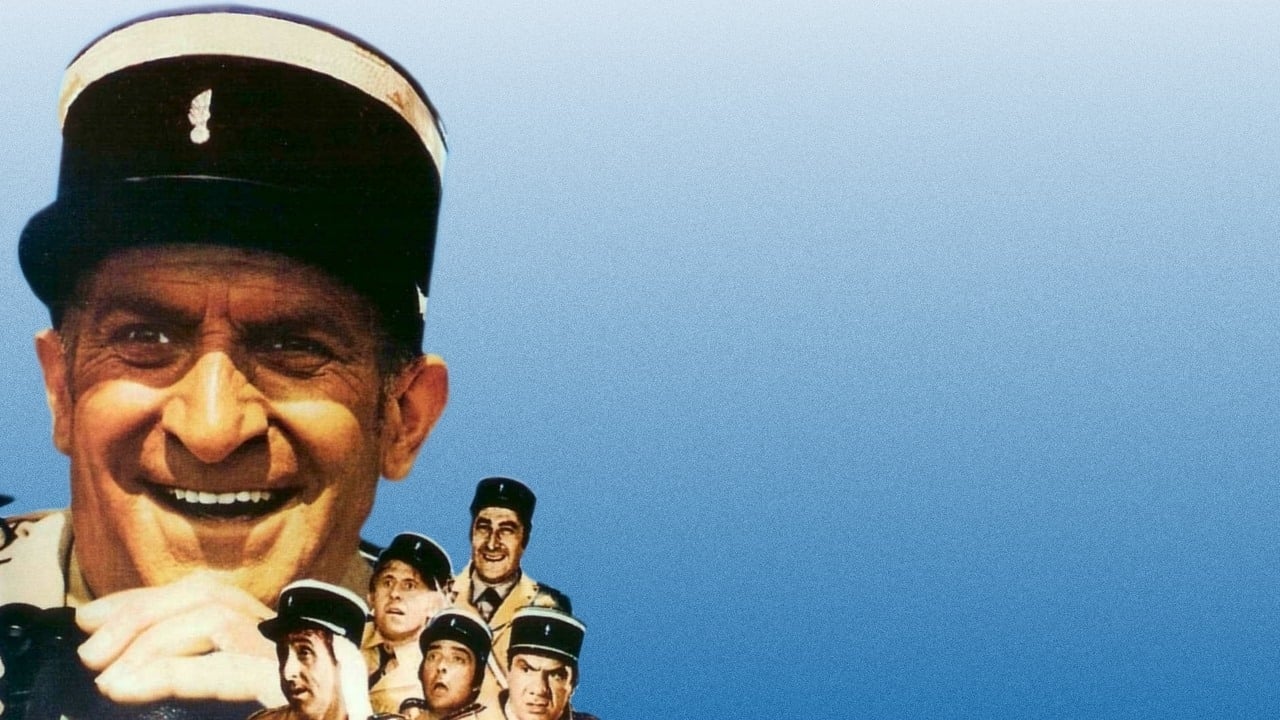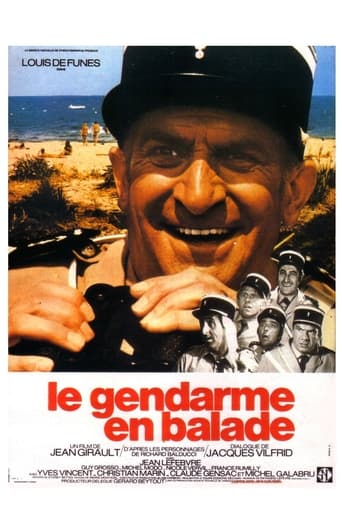

a film so unique, intoxicating and bizarre that it not only demands another viewing, but is also forgivable as a satirical comedy where the jokes eventually take the back seat.
... View MoreThis is a must-see and one of the best documentaries - and films - of this year.
... View MoreIt's a good bad... and worth a popcorn matinée. While it's easy to lament what could have been...
... View MoreThis is a small, humorous movie in some ways, but it has a huge heart. What a nice experience.
... View MoreThe entire San Trope's gendarmerie is sent in an early retirement, to replace them with younger, stronger and more modern gendarmes. But Cruchot and his friends hardly endure the boredom of pensioner's life and soon get into a series of hilarious troubles. This fourth movie doesn't bring anything especially new into the franchise, but there are no bigger flaws either. A light comedy adventure for resting the brain.6/10
... View MoreWell the seventies marked quite a weird start for Louis de Funès, with "The Troop on Vacation" and "The Orchestra Man" but I could stand the musical and its avalanche of kitschy and psychedelic effects, I even gave it a good review. I'm not sure where I stand exactly with the fourth of the "Troops" series. I know what I hate and I didn't dislike it, to say that I loved it would be an overstatement though.Obviously, Jean Girault's film doesn't take itself seriously even as a comedy so any attempt to rationalize it would be sillier than the silliest gags (and God knows there were). But there's one thing the film "takes seriously" and it's the deep bond it created between the six members of the troop, the popularity of these guys and apparently, that was more sufficient than any possible plot. I give it the credit for at least trying to do without a plot and sometimes succeeding. After all, what kind of plot could they come up with? In fact, there was such a feeling of completeness when the previous film ended, when Ludovic Cruchot (Louis de Funès) got married with the aristocratic Josepha (Claude Gensac) that I don't think any writer could have come up with something that would justify another sequel. Children? Marital life? Another nudist camp situation? Drugs? They wouldn't exist in that planet. But it's true since the first opus, we never really saw the troop together, it has always centered on De Funès, Galabru and the rest of the time, in a ratio that I would evaluate at 70%, 25% and 5%. Now, it's not perfectly balanced but it's a good 40%, 35% and 25%, and what was the best way to bring our popular gendarmes together? Simply to set them apart at the start.At the beginning, Cruchot is seen in a rather unusual situation, asleep on his desk, he's immediately awakened by the superior officer who informs the whole troop that they're being discharged, in other words, they're asked to leave and their replacements are so impressively (e)motionless they tower over the taller gendarmes. Our lousy six leave the office in civilian clothes, followed by their wives. And six months later, we meet Cruchot trying to fit within his new aristocratic costume. I was reminded of Captain Haddock lamentably trying to stay on horse or keep a monocle when he inherited the Moulinsart castle. The sequence is an excuse for a series of great gags, some of the best visual gags from a De Funès film, but you can tell they're running out of ideas once it involves a red paint over a car and Gensac screaming all over the place. Thankfully, Gerber (Galabru) pays a visit to Cruchot, announcing him that poor Fougasse is amnesic, so they decide to take one last trip to cure him. You know there's something really lacking in the inspiration closet when you have to rely on amnesia, but even that last gasp of inspiration behind Jacques Wilfrid's typewriter provided many great moments, some that even worked on a self-referential effect, so weird that I hesitated many times between calling the film 'lousy' or 'genius'. There is some genius in the way the film sacrifices any bit of credibility for the sake of laughs, fun and nostalgia, with Cruchot showing archive footage from the previous film to Gerber, or when he asks Fougasse if he remembers him by mimicking the grimaces that made him famous.Indeed, you can't tell where De Funès started and Cruchot ended. The approach culminates with the gendarmes playfully singing the theme of the movie, in the car or walking or bouncing all over the way, there are more shots of the six men together in that film than the first three combined. As for the iconic march, Funès insisted to have the theme played many times but the whole self-awareness of the film provided a surreal dimension, especially when they were trying to avoid the "real" gendarmes. They even meet the driving nurse and she asks them how come they always meet in every film, this is not even a figure of speech, film means film. The wink De Funès gave him at the end proves that it's all of a big joke and that's how we should embrace it. That the fight involves a crazy missile and children should dissipate any remaining doubt.The film loses its way more than once, making the hippie, sheep and nun part longer than needed but overall, it is is perhaps the last hurrah of the Troop series with the six original members, one last time before they would take Louis de Funès again to a sorry ride into the Sci-fi genre, nine years later. But the film proves one thing that if there's a director who contributed to De Funès' legacy, it's Gérard Oury, the next movie the actor would play were "The Orchestra Man", "Delusions of Grandeurs" and "The Mad Adventures of Rabbi Jacob" and they allowed his talent to be expressed in different situations, the Gendarme film is good entertainment, but there was more De Funès had to prove to consolidate his legend.
... View MoreThis is an extremely uneven entry from the Gendarmes series, featuring Michel Galabru at a definitive peak (for the series) but De Funès alternating between brilliance and actual boredom (like what his character goes through at first in the film). Maybe this weariness my wife and I detected in his performance here was a foreboding of some of his health issues which will, a few years later, make him stop shooting physical comedy altogether, and will finally take his life so prematurely.His faithful partner Claude Gensac wrote in her autobiography that De Funès' humour was a logical one. His characters were behaving logically even in their over-the-top reactions. But here when he goes nuts over being pampered and looked after all the time by his rich wife's staff, he insists upon dirtying the car on purpose in order to have a chance to wash it by himself and thus splashes paint all over it only to empty in the process another bucket of paint on top of his own head You would never have seen a gag like this in a classic Gendarmes such as "Le gendarme de St. Tropez" or "Le gendarme se marie", because it does not make sense! That the priest enters into a grimace contest with De Funès in plain view before his wife – however funny some of those face exchanges can be – doesn't make any sense either and is gratuitous! There is also mediocre acting on the part, for instance, of the butler, which doesn't help some of those poorly written, ill-warranted or directed scenes But when the Gendarmes don their uniforms under the orders of the hilariously perfect (i.e. constantly serious, grave and solemn) adjutant Gerber, we are OK gain, and the situations can get really funny, like the talking whistle bit which another reviewer has described so well!
... View Morei totally agree with the first review! This film is "wet yourself" laugh out loud funny, funny, funny!!!! it is definitely hilarious. At the start of the film, De Funès is very convincing as the bored rich man who longs for his former job, as he is not allowed to do anything strenuous, but WANTS to! (spoiler: he is lifted on to a horse with a forklift, fishes are put on his hook in the pond by a diver!). then, when he gets together with his old gendarme-mates, who are also bored without their old job, the film really starts to get hilarious. his usual manic gesturing and shouting is very funny, the scene where they all manage a traffic congestion in their old uniforms as "gendarmes" again, is brilliant ("we got to aggravate a minister"!!!), they end up in a hippie-car and in a hippie community smoking pot (very funny!), there is mad, hilarious fast (speeded up film) driving with lots of people crammed in and sticking out of cars, including a scene with the mad,"wild" nun, now two of them!, who also drive like mad, which is a brilliant bit in (almost?) every gendarme-film. toward the end portion of the film it all gets quite silly, real farce, but all very amusing, laugh out loud. the nudist-gag from film one is also "recycled", with a twist!all in all, a hilarious film, one of the best,maybe THE best, gendarme-films with Louis de Funès, together with part 3 of this series. must-see for comedy/slapstick/farce-fans and the humor is timeless. thumbs up!!!!
... View More